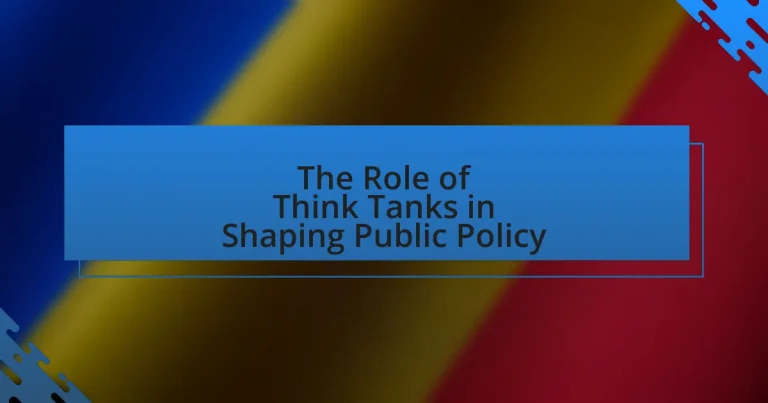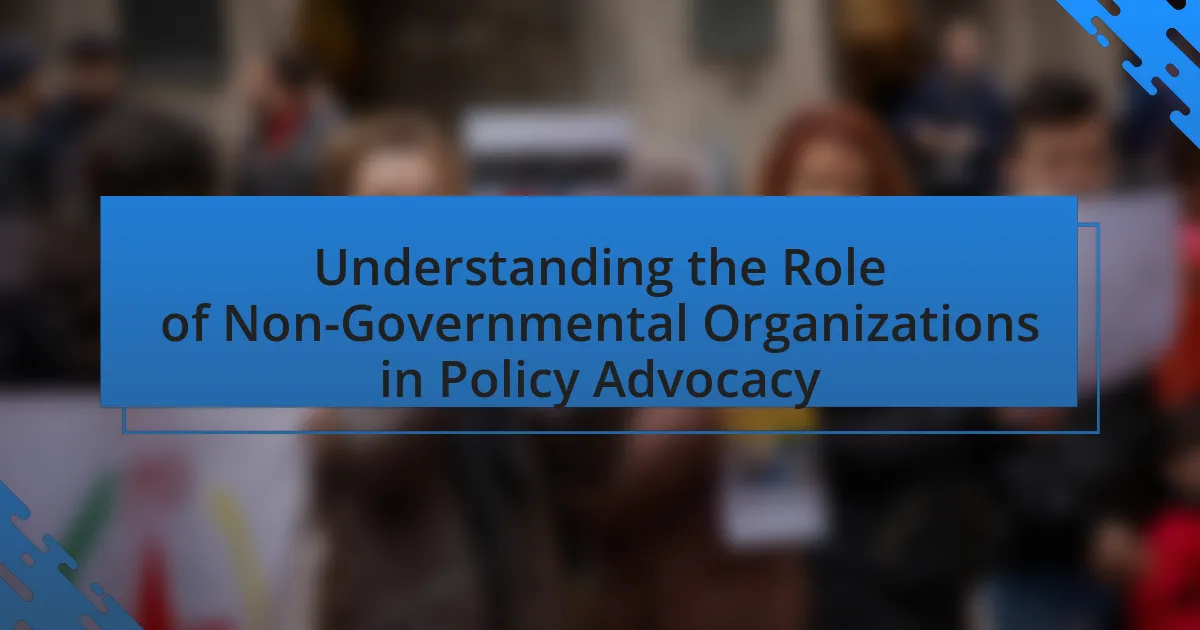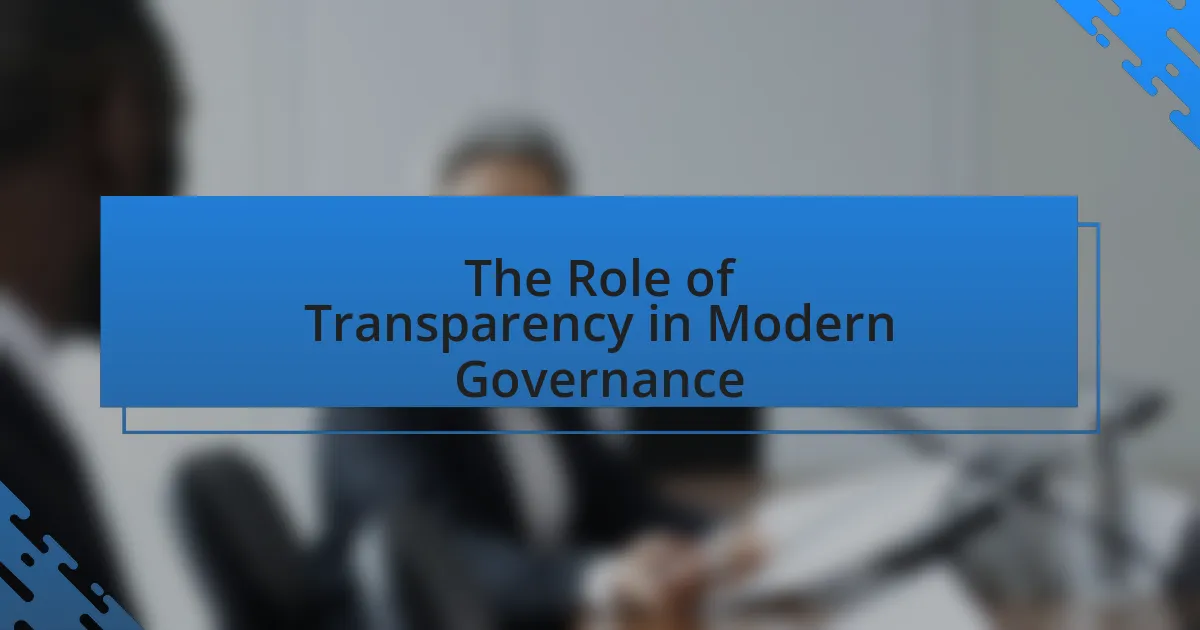Think tanks are research organizations that analyze and develop policy ideas to influence public policy decisions. They provide evidence-based research, expert analysis, and innovative solutions to complex societal issues, thereby shaping legislative agendas and informing policymakers. The article explores how think tanks influence the policy-making process through research, advocacy, and public engagement, while also examining the various types of think tanks, their methodologies, and the challenges they face. Additionally, it discusses the importance of think tanks for democracy, their role in promoting informed debate, and the potential biases in their research. Notable examples of think tanks and their impact on recent policies are highlighted, along with best practices for enhancing their effectiveness in shaping public policy.
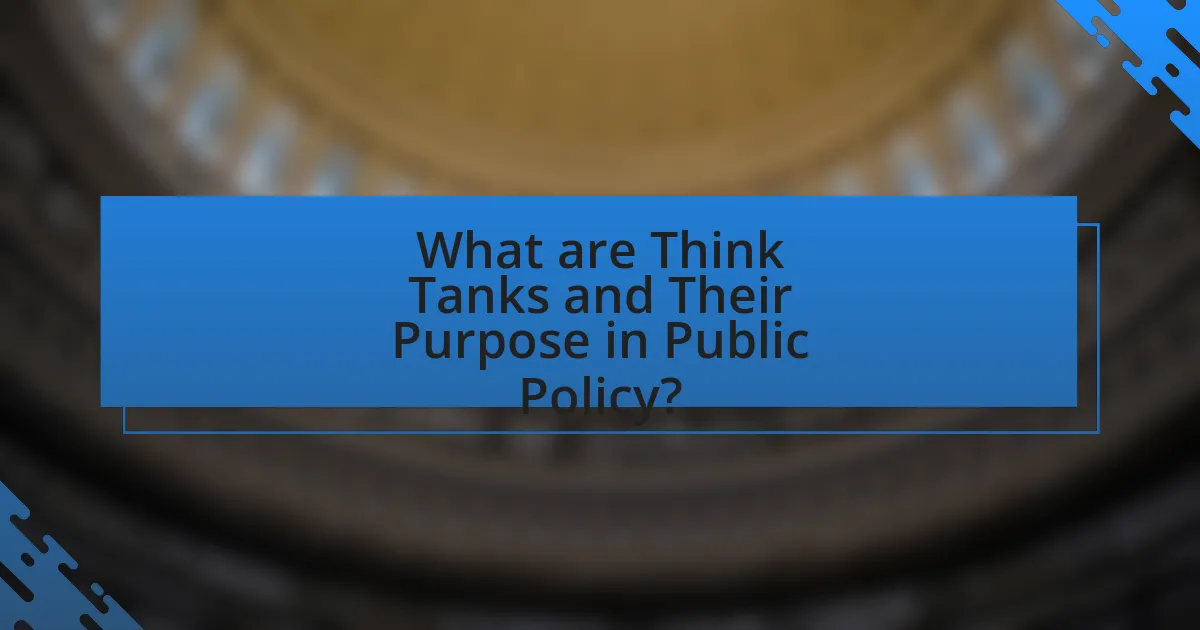
What are Think Tanks and Their Purpose in Public Policy?
Think tanks are research organizations that analyze and develop policy ideas to influence public policy decisions. Their primary purpose is to provide evidence-based research, expert analysis, and innovative solutions to complex societal issues, thereby shaping the legislative agenda and informing policymakers. For instance, the Brookings Institution, established in 1916, has played a significant role in U.S. policy development by producing studies on economic policy, governance, and foreign relations, demonstrating the impact think tanks can have on public discourse and decision-making.
How do Think Tanks influence the policy-making process?
Think tanks influence the policy-making process by conducting research, providing expert analysis, and advocating for specific policy solutions. They serve as intermediaries between academic research and government decision-making, often shaping the agenda by identifying key issues and proposing actionable recommendations. For instance, the Brookings Institution and the Heritage Foundation have historically impacted U.S. policy through their comprehensive reports and policy briefs, which are frequently referenced by lawmakers. Additionally, think tanks often engage in public outreach and media campaigns to raise awareness and support for their policy proposals, further embedding their influence in the political discourse.
What methods do Think Tanks use to conduct research?
Think tanks use a variety of methods to conduct research, including qualitative and quantitative analysis, literature reviews, case studies, surveys, and expert interviews. These methods allow think tanks to gather data, analyze trends, and develop policy recommendations. For instance, quantitative analysis often involves statistical methods to interpret numerical data, while qualitative analysis focuses on understanding complex issues through interviews and focus groups. Literature reviews help synthesize existing research, and case studies provide in-depth insights into specific instances of policy implementation. Surveys enable think tanks to collect public opinion data, which can inform their findings. These diverse methodologies ensure that think tanks produce well-rounded and evidence-based research that influences public policy effectively.
How do Think Tanks disseminate their findings to policymakers?
Think tanks disseminate their findings to policymakers primarily through policy briefs, reports, and direct engagement. These organizations produce concise documents that summarize research findings and policy recommendations, making them accessible to decision-makers. Additionally, think tanks often host events, such as seminars and workshops, where they present their research and facilitate discussions with policymakers. They also utilize media outreach, including press releases and op-eds, to reach a broader audience and influence public discourse. For instance, a study by the Brookings Institution highlights that direct interactions between think tank researchers and policymakers significantly enhance the likelihood of research being utilized in policy formulation.
Why are Think Tanks important for democracy?
Think tanks are important for democracy because they provide research, analysis, and policy recommendations that inform public debate and decision-making. By generating evidence-based insights, think tanks help to shape policies that reflect the needs and values of society. For instance, studies show that think tanks contribute to the development of democratic governance by promoting transparency, accountability, and informed citizen engagement. Their role in disseminating knowledge and fostering dialogue among stakeholders enhances the democratic process, ensuring that diverse perspectives are considered in policy formulation.
What role do Think Tanks play in promoting informed debate?
Think tanks play a crucial role in promoting informed debate by conducting research, analyzing policy issues, and disseminating findings to the public and policymakers. They provide evidence-based insights that help clarify complex topics, enabling stakeholders to engage in meaningful discussions. For instance, the Brookings Institution and the Cato Institute regularly publish reports that influence public discourse on economic and social policies, demonstrating how think tanks can shape opinions and inform decision-making processes.
How do Think Tanks contribute to accountability in government?
Think tanks contribute to accountability in government by conducting research, providing policy analysis, and promoting transparency in decision-making processes. They serve as independent entities that evaluate government actions and policies, often highlighting inefficiencies or areas for improvement. For instance, the Brookings Institution and the Cato Institute regularly publish reports that assess the effectiveness of government programs, thereby holding officials accountable for their performance. Additionally, think tanks engage in public discourse, facilitating informed debate and encouraging citizen participation, which further pressures government entities to act responsibly and transparently.
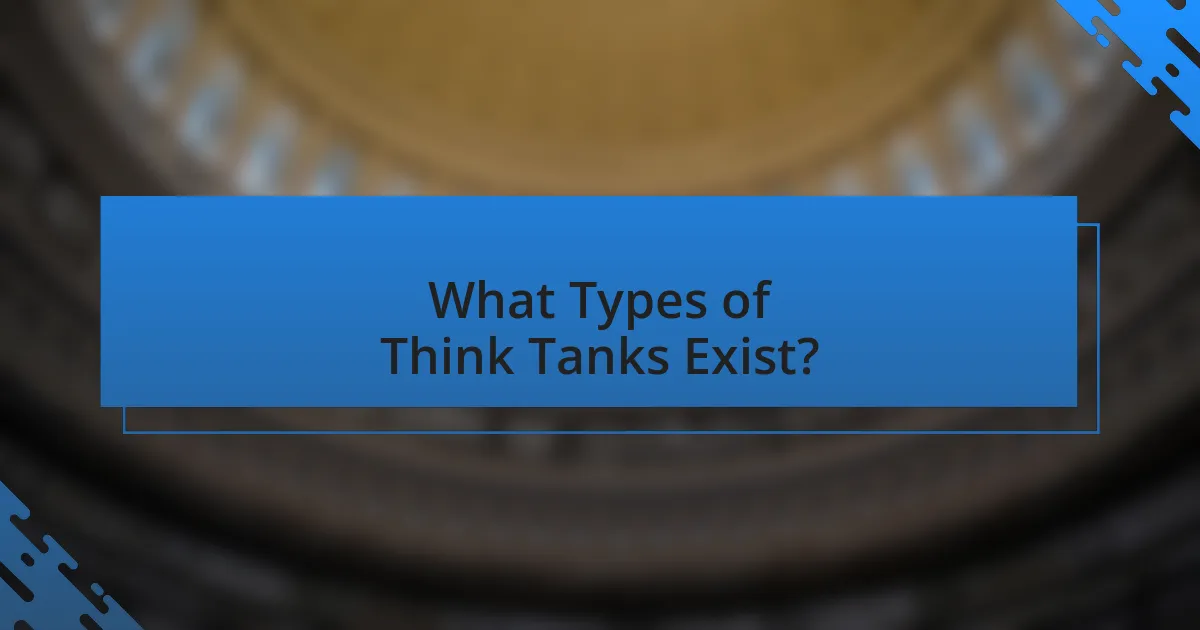
What Types of Think Tanks Exist?
There are several types of think tanks, including policy-oriented, academic, and advocacy think tanks. Policy-oriented think tanks focus on research and analysis to influence public policy decisions, such as the Brookings Institution and the Heritage Foundation. Academic think tanks, like the National Bureau of Economic Research, primarily engage in scholarly research and contribute to academic discourse. Advocacy think tanks, such as the Center for American Progress, aim to promote specific political agendas and mobilize public opinion. Each type plays a distinct role in shaping public policy through research, analysis, and advocacy efforts.
How do different types of Think Tanks vary in their approaches?
Different types of think tanks vary in their approaches primarily based on their ideological orientation, funding sources, and target audiences. For instance, policy-oriented think tanks, such as the Brookings Institution, focus on empirical research and bipartisan solutions, while advocacy think tanks, like the Heritage Foundation, promote specific ideological agendas and policy recommendations. Additionally, academic think tanks often emphasize theoretical frameworks and scholarly research, whereas corporate think tanks may prioritize business interests and market-driven solutions. This diversity in approaches reflects the varying missions and objectives of think tanks, influencing how they engage with policymakers and the public.
What distinguishes public policy Think Tanks from academic ones?
Public policy think tanks primarily focus on practical policy solutions and advocacy, while academic think tanks emphasize theoretical research and knowledge generation. Public policy think tanks engage directly with policymakers and the public to influence legislation and public opinion, often producing actionable reports and recommendations. In contrast, academic think tanks typically prioritize peer-reviewed research and scholarly discourse, contributing to the body of knowledge without immediate policy implications. This distinction is evident in the operational goals and outputs of each type, with public policy think tanks aiming for direct impact on governance and societal issues, whereas academic think tanks contribute to long-term intellectual frameworks and theories.
How do advocacy Think Tanks differ from neutral research organizations?
Advocacy think tanks differ from neutral research organizations primarily in their objectives and approaches. Advocacy think tanks actively promote specific policy agendas and often engage in lobbying efforts to influence public opinion and government decisions, whereas neutral research organizations focus on providing unbiased, objective analysis and data without advocating for particular outcomes. For example, the Brookings Institution, which conducts research but also engages in advocacy, contrasts with the RAND Corporation, which emphasizes impartial research and analysis. This distinction is crucial in understanding how each type of organization contributes to public policy discourse.
What are some notable examples of Think Tanks?
Notable examples of think tanks include the Brookings Institution, the Heritage Foundation, and the Carnegie Endowment for International Peace. The Brookings Institution, established in 1916, is known for its research on economic and social policy. The Heritage Foundation, founded in 1973, focuses on conservative public policy research and advocacy. The Carnegie Endowment for International Peace, created in 1910, specializes in international affairs and global peace initiatives. These organizations significantly influence public policy through their research, publications, and expert testimonies.
What impact have specific Think Tanks had on recent policies?
Specific think tanks have significantly influenced recent policies by providing research, analysis, and recommendations that shape legislative agendas. For instance, the Brookings Institution has played a crucial role in shaping economic policy through its comprehensive studies on fiscal stimulus and tax reform, which informed the American Rescue Plan Act of 2021. Similarly, the Heritage Foundation has impacted conservative policy initiatives, particularly in areas like healthcare and immigration, by advocating for specific reforms that align with its ideological framework. These think tanks leverage their expertise and networks to engage policymakers, thereby directly affecting the formulation and implementation of public policies.
How do regional Think Tanks address local issues differently?
Regional think tanks address local issues differently by focusing on context-specific research and solutions tailored to the unique socio-economic and political landscapes of their areas. Unlike national think tanks, which may prioritize broader, generalized policies, regional think tanks engage directly with local stakeholders, including community leaders and residents, to identify pressing issues and develop targeted strategies. For example, a regional think tank in the Midwest may concentrate on agricultural policies that directly impact local farmers, while a think tank in an urban area might focus on housing and transportation challenges specific to that city. This localized approach ensures that the recommendations made are relevant and actionable, reflecting the distinct needs and priorities of the community they serve.
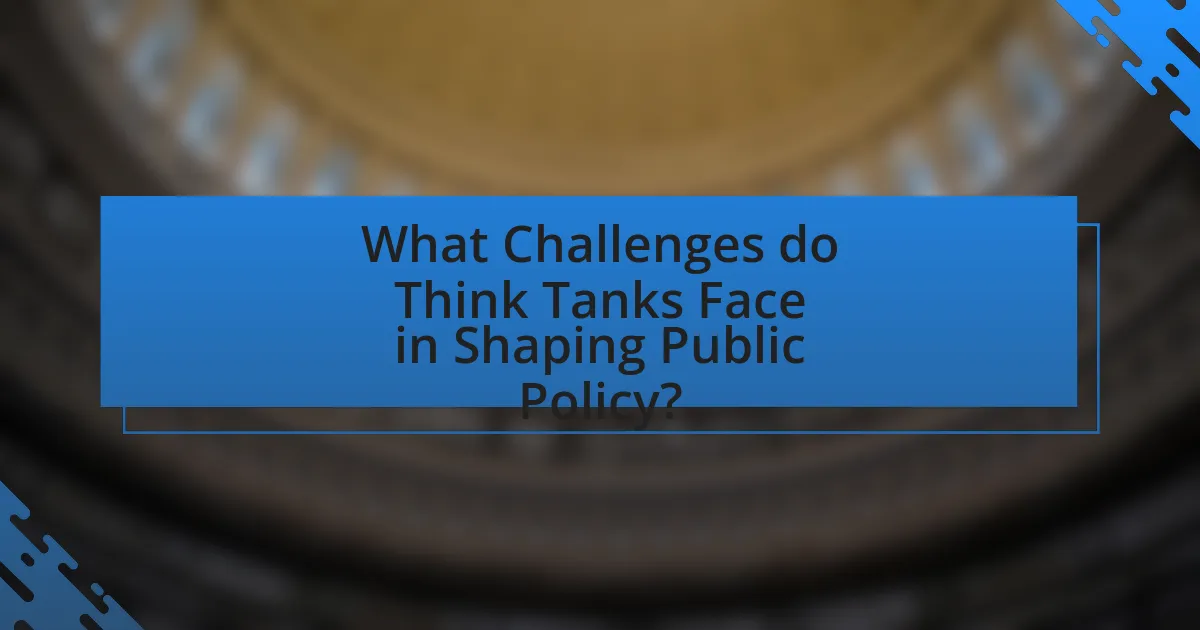
What Challenges do Think Tanks Face in Shaping Public Policy?
Think tanks face several challenges in shaping public policy, including limited funding, political bias, and the difficulty of translating research into actionable policy. Limited funding restricts their ability to conduct comprehensive research and outreach, as many rely on donations and grants that may come with specific agendas. Political bias can undermine their credibility, as stakeholders may question the objectivity of their findings based on perceived affiliations. Additionally, the complexity of policy issues often makes it challenging for think tanks to communicate their research effectively to policymakers, who may lack the time or expertise to engage with detailed studies. These challenges hinder the overall impact of think tanks on public policy formulation and implementation.
How do funding sources affect the independence of Think Tanks?
Funding sources significantly affect the independence of think tanks by influencing their research agendas and policy recommendations. When think tanks rely heavily on specific donors, such as corporations or government entities, they may face pressure to align their outputs with the interests of those funders. For instance, a study by the Brookings Institution found that think tanks funded by corporate interests often produce research that favors the perspectives of those corporations, potentially compromising their objectivity. This dependency can lead to a lack of diverse viewpoints and limit the think tanks’ ability to challenge prevailing narratives, ultimately affecting their credibility and effectiveness in shaping public policy.
What are the implications of Think Tanks being funded by private interests?
Think tanks funded by private interests can lead to biased research and policy recommendations that favor the funders’ agendas. This funding model often results in a lack of transparency, as the influence of private donors may not be disclosed, potentially skewing public discourse and undermining democratic processes. For instance, a study by the Brookings Institution found that think tanks receiving substantial funding from corporations tend to produce reports that align with corporate interests, thereby affecting legislative outcomes and public opinion. This dynamic raises concerns about the integrity of policy-making and the representation of diverse viewpoints in public debates.
How can Think Tanks maintain credibility amidst political pressures?
Think tanks can maintain credibility amidst political pressures by adhering to rigorous research standards and ensuring transparency in their funding sources. By employing evidence-based methodologies and peer-reviewed processes, think tanks can produce reliable data that withstands scrutiny. For instance, the Brookings Institution emphasizes transparency in its funding, which helps mitigate perceptions of bias and enhances trust among stakeholders. Additionally, think tanks can engage in public discourse by presenting diverse viewpoints and fostering open debates, which reinforces their role as impartial knowledge providers. This approach not only bolsters their credibility but also aligns with the expectations of policymakers and the public for objective analysis in shaping public policy.
What criticisms do Think Tanks encounter?
Think tanks encounter several criticisms, primarily related to their perceived lack of transparency and potential biases in their research. Critics argue that many think tanks are funded by private interests or government entities, which can influence their policy recommendations and lead to conflicts of interest. For instance, a report by the Center for Media and Democracy highlights that some think tanks receive substantial funding from corporations, which may skew their analyses to favor those entities’ interests. Additionally, think tanks are often criticized for promoting ideologically driven agendas rather than objective research, which can undermine public trust in their findings.
How do critics argue that Think Tanks can distort public discourse?
Critics argue that think tanks can distort public discourse by promoting biased information that aligns with their funding sources and ideological agendas. This occurs as many think tanks receive financial support from corporations or political entities, which can lead to the prioritization of specific narratives over objective analysis. For instance, a study by the Center for Media and Democracy found that a significant number of think tanks produce reports that favor the interests of their donors, thereby skewing public understanding and debate on critical issues. This manipulation of information can create an environment where public discourse is shaped more by vested interests than by factual, balanced perspectives.
What are the potential biases in Think Tank research and recommendations?
Potential biases in Think Tank research and recommendations include ideological bias, funding bias, and selection bias. Ideological bias occurs when the research reflects the political or philosophical beliefs of the think tank, potentially skewing conclusions to align with specific agendas. Funding bias arises when the financial support from particular donors influences the research outcomes, leading to recommendations that favor the interests of those donors. Selection bias can manifest in the choice of topics or data that are prioritized, which may omit critical perspectives or evidence that contradict the think tank’s stance. These biases can significantly affect the credibility and objectivity of the research, impacting public policy decisions.
What best practices can Think Tanks adopt to enhance their impact?
Think Tanks can enhance their impact by adopting a strategic focus on evidence-based research, effective communication, and stakeholder engagement. Evidence-based research ensures that their policy recommendations are grounded in solid data, which increases credibility and influence. For instance, a study by the Brookings Institution found that policy proposals backed by rigorous analysis are more likely to be adopted by policymakers. Effective communication involves tailoring messages to diverse audiences, utilizing various platforms, and engaging in public discourse to raise awareness of their findings. Additionally, active stakeholder engagement, including collaboration with government officials, NGOs, and the private sector, fosters partnerships that can amplify their reach and effectiveness. Research from the RAND Corporation highlights that think tanks that engage with a broad range of stakeholders can significantly enhance their policy impact.
How can Think Tanks improve their engagement with policymakers?
Think tanks can improve their engagement with policymakers by fostering direct communication channels and providing timely, relevant research that addresses current policy challenges. Establishing regular briefings, workshops, and collaborative forums allows think tanks to present their findings and recommendations directly to decision-makers. For instance, the Brookings Institution has successfully engaged policymakers by hosting events that facilitate dialogue on pressing issues, thereby enhancing the visibility and impact of their research. Additionally, think tanks can leverage social media and digital platforms to disseminate information quickly, ensuring that policymakers have access to the latest insights and data when making decisions. This approach not only strengthens relationships but also positions think tanks as essential resources in the policymaking process.
What strategies can Think Tanks use to communicate effectively with the public?
Think tanks can communicate effectively with the public by utilizing clear messaging, engaging storytelling, and leveraging multiple platforms. Clear messaging ensures that complex policy ideas are distilled into understandable concepts, which is crucial for public comprehension. Engaging storytelling helps to connect emotionally with the audience, making the information more relatable and memorable. Leveraging multiple platforms, such as social media, podcasts, and public events, allows think tanks to reach diverse audiences and foster dialogue. For instance, a study by the Brookings Institution found that think tanks that actively engage on social media platforms increase their visibility and influence in public discourse.
